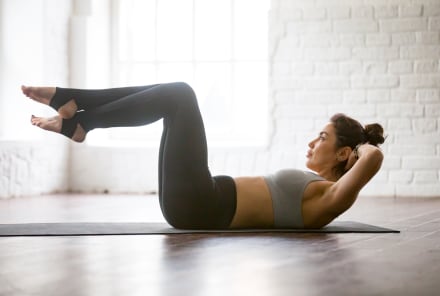Advertisement

Anyone else notice that recovery and rest days are cropping up more and more in the fitness convo right now? It's not just Epsom salt baths and foam rollers these days—you've got everyone from yogis to HIIT loyalists spreading the love about personal massaging devices, CBD oils, cupping—with their posts tagged #RestDayBrag for proof.
Rest days are anything but a lazy luxury, and if you've ever felt the soreness from a string of tough workouts, you know firsthand how essential they are—not just to prevent injuries, fatigue, and burnout but to simply stay healthy. Achy muscles aside, without proper rest in any active routine, our physical and mental well-being takes a hard-to-ignore hit. Studies have shown that the combination of excessive exercise and inadequate recovery can lead to dips in performance1, and some researchers have found that even two days of intense workouts suggested a potential drop in immunity2.
"Rest days are important for the simple fact that without the ability to press pause and take a break, eventually it won't be a choice—it will be mandatory," echoes NYC-based movement coach Daniel Gottlieb. "Rest allows us to take inventory of our personal practice. We can observe and refine our movement patterns and fine-tune where necessary." Read on below to get some helpful hints for taking better, smarter, and more optimized rest days:
Make it routine, no questions asked.
Depending on the intensity of your fitness routine and what feels right for your body, Gottlieb, who is a former college basketball star and yoga trainer for NBA's Detroit Pistons, recommends devoting at least two days a week to active recovery. Find a time that works for you—and get specific, scheduling in a feel-good recovery ritual or use of a recovery tool like you would schedule a gym class.
To address rising tissue inflammation, try a self-myofascial release like a foam-rolling routine or trigger-point therapy. Massage and cryotherapy, if it's available to you, are powerful ways to reduce soreness3 from muscle inflammation, and acupuncture can help treat any imbalances, says Gottlieb.

One thing we all can do is close out active rest days with a wind-down routine that supports more restful sleep. Before bed, begin to relax physically and mentally: Unplugging from social media, reading a book, and supplementing with herbal sleep aids like magnesium are helpful for alleviating any stress and stimulating the body's sleep and relaxation response. One great option for optimizing your recovery is Nuun Rest—tablets that dissolve in your glass of water and provide a blend of magnesium, potassium, and tart cherry that melts away muscle tension, calms rapid brain activity, and relieves stress to get your body and mind to a restful state. With these ingredients, you'll also be supporting your body's recovery process from exercise—a win-win.
Don't skimp on the mental R&R.
Speaking of calming your mind, make mental relaxation a big part of your rest day: Studies on college football players4 (talk about injury-prone athletes) have found that they were more susceptible to injury during stressful periods of the academic year. In other words: Soreness and injury from exercise can be exacerbated by stress.
"In thinking about optimizing rest days," says Gottlieb, "you know you are at rest on a purely physical level when you're not moving. But the ultimate state of rest is when the mind has slowed down." Be mindful of your stress levels and manage it accordingly—try incorporating meditation on rest days to clear your head or spending a few minutes focusing on a breathwork exercise if you're feeling anxious about something—your body will thank you the next day.
Keep the rest conversation going.
"Full recovery is essential to optimal performance and improvement," says Gottlieb. "With hashtags like #RestDayBrag, we're normalizing the conversation and not feeling guilty—or even lazy—about taking the day or two off." Simply put, better rest today equals a better self tomorrow. Rather than viewing rest days as an afterthought or the final day in a week's worth of workouts, we can all try to shift the framework and practice rest as an essential component of our movement and mental health.
Thankfully, there are as many ways to optimize your rest day as there are to get your heart rate up on training and gym days. How you help your body rest and reset is ultimately up to you: All it takes is finding something you love (for us, that's winding down with Nuun Rest in Lemon Chamomile at bedtime) and spreading the word.
"When we truly give ourselves permission to rest and repair, we are both mentally and physically allowing for the space to grow, learn, and facilitate change in our lives," Gottlieb says. "Just make sure once you set the intention that you honor that time you have given yourself to welcome the rest."

Short On Time? Try This Personal Trainer's 5-Minute Full-Body Workout
Krista Stryker, NSCA-CPT

Short On Time? Try This Personal Trainer's 5-Minute Full-Body Workout
Krista Stryker, NSCA-CPT

Short On Time? Try This Personal Trainer's 5-Minute Full-Body Workout
Krista Stryker, NSCA-CPT

Short On Time? Try This Personal Trainer's 5-Minute Full-Body Workout
Krista Stryker, NSCA-CPT










